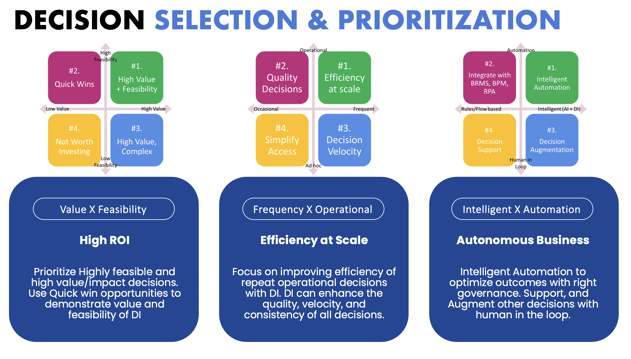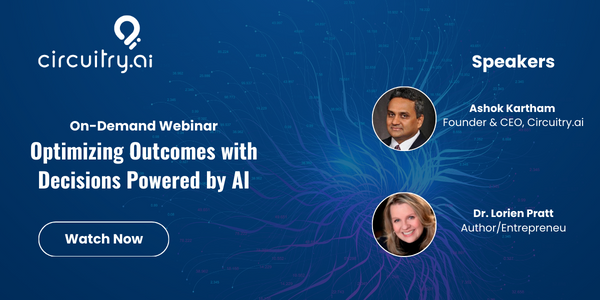In a recent webinar hosted by Circuitry.ai about "Optimizing Outcomes with Decisions Powered by AI," Ashok Kartham, Founder & CEO of Circuitry.ai, joined Dr. Lorien Pratt to answer a wide range of questions.
This two-part blog post has been transcribed and you can watch the webinar here.
DI: What is Decision Intelligence (DI)?
Ashok Kartham: Decision Intelligence links decisions leading to actions and outcomes. Decision Intelligence enables businesses to model, analyze, augment, automate, monitor, and orchestrate decisions informed by better knowledge and predictions.
One way to understand DI is to contrast it with recent digital transformation initiatives. Over the last two decades, we have gotten much better at generating, collecting, and storing data in the cloud, accessing it on any device, and visualizing it to some extent. But these systems, called Systems of Record and Systems Engagement, expect people to make sense of, decide, and act on that data, which could be overwhelming as the data grows exponentially.
.png?width=600&height=400&name=what-is-di%20(1).png)
DI and new systems of intelligence focus on making decisions that lead to actions. DI can augment people's ability to make sense of the data so they can make better decisions or automate decisions and actions. So, DI is a logical and critical next step in the evolution of digital transformation.
DI will expand people's capabilities by bridging the gap between data and outcomes in a more meaningful way by applying advances in AI/ML.
DI: What kinds of decisions does Decision Intelligence address?
AK: Businesses and people make billions of decisions annually. While Decision Intelligence can help with many decisions, I want to share three frameworks that will help you identify where DI can have the most impact.
First, you need to start with decisions that can provide the most value and match them with feasibility to augment/automate those decisions. The feasibility can be technological, data, and even company readiness. If you take the four quadrants, the most important decisions to focus on are high-value and most feasible while realizing a few quick wins from the decisions that can be implemented immediately.
Next, you can look at the frequency and type of decisions. More frequent operational decisions are more suitable for automation.
Then, you can look at decisions where intelligence is required and can be automated. All decisions don't need AI. If they are based on simple conditional logic, you can use traditional business rules or business process management.

In Summary, while Decision Intelligence can help with all types of decisions, you can realize better value by identifying high-value, feasible, frequent, operational decisions requiring intelligent automation.
DI: Why Decision Intelligence, and what benefits can companies expect?
AK: The main benefits of Decision Intelligence come from optimizing outcomes such as increased sales, cost savings, productivity gains, and risk mitigation. Decision Intelligence also improves the quality, velocity, efficiency, and consistency of decisions so you can scale organizations more effectively.
Recently, I had a chance to talk to several companies about DI. Their feedback brought up one benefit: they can ramp up new people quickly with the support of DI, and they can make decisions at the same level as experienced people. This consistency in the quality of decisions at various levels could be another one of the benefits of adopting decision intelligence.
DI: How can companies apply AI/ML to make better decisions?
AK: Imagine if you have easy access to all the knowledge, can predict outcomes, and have all the decision toolset, you will make better decisions every time. Applied AI for decisions is making these superpowers more accessible to people so they can make better decisions.
Gen AI provides easier access to knowledge through natural conversations and semantic search of the knowledge bases. AI-powered analytics can help make better predictions of outcomes and inform decisions based on various data sources. Composite AI applies various AI algorithms to create intelligent business applications and processes. AI agents can help automate the execution of actions. Reinforcement learning and optimization algorithms can help optimize outcomes.
One of the best examples of AI is Autonomous driving. Autonomous cars use multiple forms of AI, including machine learning, computer vision, sensor data fusion, natural language processing, path planning algorithms, and more, to enable cars to navigate complex environments safely and efficiently.
I believe Decisions powered by AI can help build autonomous business processes similar to autonomous cars.
DI: Can you please share some use cases? What type of decisions can AI help optimize?
AK: Any process where people are facing many choices and can impact business outcomes through their decisions can be a good use case for applying decision intelligence.
I want to share a couple of examples. Today, Product SKUs and choices are increasing. Product features are getting more complex, making it harder for people to understand. This product choice and complexity results in lost sales and customer churn.
An intelligent product advisor can be trained on all product catalogs, content, and reviews can help consumers make more informed product selections, summarize reviews, and answer specific questions. Recommendation algorithms, which have become very popular in entertainment selection, can be applied to product selection for all companies.
Decision Intelligence applications such as Circuitry.ai Product AIdvisor make intelligent and guided product discovery and recommendation capabilities available for all manufacturers, channel partners, and customers. A service advisor trained in all service knowledge, historical service data, and sensor data collected from connected products using IoT can help with customer self-service, call center agents, and service technicians.
Another use case in manufacturing is advanced quality analysis powered by Decision Intelligence to identify emerging issues and reduce detection to correction cycle time on product defects. Quality Analysis can use data from multiple sources, such as Warranty, Returns, Service, Support, sensors, and IoT, and apply predictive and prescriptive analytics. Manufacturers can reduce the cost of warranty, returns, and recalls while improving customer satisfaction and retention.
Many other valuable use cases for decision intelligence include dynamic pricing, supply chain optimization, inventory management, predictive maintenance, and more.
Be sure to look out for part two of the QA from our latest webinar, "Optimizing Outcomes with Decisions Powered by AI".
